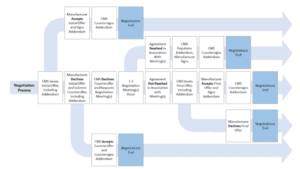A 'New Normal' Can't Mean the Same Old Health Insurance | Opinion – Newsweek

President Joe Biden, in his first State of the Union, laid out a sweeping plan for the ‘new normal’ under the pandemic, with health care affordability as one of its centerpieces. As health care providers, we know the president’s plan to close the Medicaid coverage gap and make health care premium subsidies more available would make a huge difference for our patients, especially amid an unpredictable pandemic and rising inflation.
In the emergency department, we have seen countless patients struggle to afford health care coverage—risking their lives as a result. Take for example, John. Treating him in the emergency department, he took ragged breaths as we explained that he had been diagnosed with a life-threatening blood clot and needed to stay in the hospital. Despite that news, John resisted. We anxiously froze as he explained that his employer did not offer health insurance, he could not afford to buy a plan and the state had not expanded Medicaid. John refused to burden his family with any medical debt and left the hospital against our medical advice.
Millions of patients like John cannot afford health insurance, either because current health insurance premiums remain too high, or because they live in states that have not expanded Medicaid, the public health insurance program for low-income Americans, under the Affordable Care Act (ACA). The latter means millions of Americans fall into the Medicaid coverage gap: making too much to qualify for Medicaid in their state, but not enough for private health insurance premium subsidies. Research shows that the uninsured face higher rates of death, out-of-pocket spending and medical debt. With over 28 million Americans uninsured, President Biden’s call in his State of the Union to “close the coverage gap and make those [ACA exchange] savings permanent” would create critical pathways for patients, like John, to access affordable health care.
Extending ACA Exchange Premium Subsidies
A key proposal from President Biden’s health agenda centers on capping the cost for purchasing health insurance on the private insurance marketplace exchanges. Marketplace plans, created under the Affordable Care Act, include significant consumer protections and offer subsidies (via tax credits) to assist families in purchasing a plan. Under Biden’s proposal, families earning between 100 to 150 percent of the Federal Poverty Level ($28,000-$42,000/year for a family of four) would pay no premiums at all for a “silver-tier” benchmark plan. And no American would pay more than 8.5 percent of their income toward health insurance. Currently, the average American family spends 11.6 percent of its income on health insurance.
This provision has already produced impressive results. The 2021 American Rescue Plan (ARP) offered similar subsidies. In response, a record-breaking 14.5 million Americans signed up for marketplace plans for 2022. Moreover, data shows that heightened insurance subsidies saved the average family over $800 per year—a lifeline for many Americans struggling to make ends meet between rent, childcare, groceries and inflation.
A doctor checks in on a patient.
APU GOMES/AFP via Getty Images
Yet, this progress is under threat with ARP subsidies set to expire at the end of this year without congressional action, meaning enrollees’ premiums could double. That is bad news. For too many patients, affordable health insurance can be the difference between life and death.
Closing the Medicaid Coverage Gap
President Biden has made closing the Medicaid gap another pillar of his plan to promote affordable health coverage. The Medicaid coverage gap exists because policymakers in 12 states have refused to expand Medicaid under the Affordable Care Act. This leaves an estimated 2.2 million individuals in a gap where they make too much to qualify for Medicaid, but not enough for existing ACA marketplace subsidies. For example, in Alabama, a non-expansion state, a family of four making as little as $38,000 a year would not qualify for the state’s Medicaid program.
Democrats originally proposed expanding Affordable Care Act marketplace subsidies to all individuals who fall into this coverage gap, making affordable health care coverage a viable option for millions more Americans. In places like D.C., which have expanded Medicaid, we have seen firsthand the impact of Medicaid access for low-income patients. It allows them to afford their life-sustaining medications, avoid crushing medical bills and better access primary and specialty care. Extending these benefits to the millions of Americans living in states that have not expanded Medicaid would be a huge stride in improving our nation’s health.
Time for Action
Critics often voice concern over the cost of these health care provisions. But data shows that having affordable health care coverage helps keep people healthy and in the workforce. Moreover, health care coverage reduces the risk of devastating medical costs that force too many Americans to take on medical debt, the leading cause of bankruptcy in the U.S.
For patients like John, being able to access affordable health care on the ACA exchanges or through Medicaid expansion would have been a lifeline. It would have allowed him to seek timely preventive and emergency care and reduce his fear of looming medical debt.
We work in health care because we believe in caring for people regardless of their insurance status, but our nation’s current insurance structure forces Americans, like John, to forgo needed care. This does not need to be the case. Biden’s health care proposals extending marketplace subsidies and closing the Medicaid gap would have tremendous, concrete impacts on both our patients and millions of Americans.
While policymakers continue to debate President Biden’s health priorities, his health insurance affordability proposals must stay front and center in the “new normal.” Our patients—and millions of Americans—cannot afford otherwise.
Marisa K. Dowling, M.D. M.P.P., is a clinical assistant professor at the George Washington University Department of Emergency Medicine.
Jesper Ke is a medical student at the University of Michigan.
David Velasquez is a student of medicine, public policy and business at Harvard University.
The views expressed in this article are the writers’ own.






